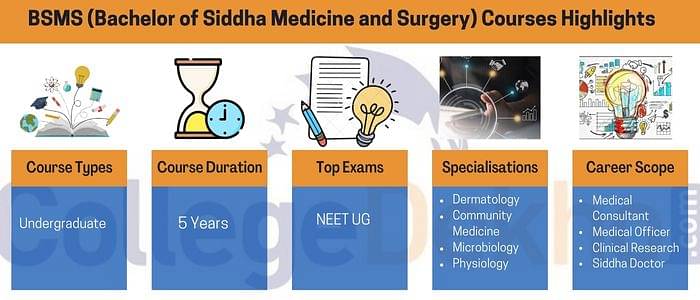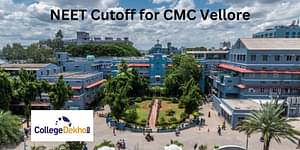BSMS Course
About BSMS (Bachelor of Sidhha Medicine and Surgery)
Among the AYUSH courses offered in educational institutions, students across India also pursue Siddha Medicine. Medical colleges offer this course at the undergraduate level. The duration of the course is 5 years, like other medical courses.
Students can apply for this undergraduate course after they have completed their high school education. Aspirants must make sure to secure at least 50% marks in their aggregate. The popular entrance exam that grants admission to the BSMS (Bachelor of Siddha Medicine and Surgery) course is NEET-UG which is conducted on the National level.
There are several colleges in India that offer admission to Bachelor of Siddha Medicine and Surgery degrees. Some of the popular colleges are Kila Thiruvithamcore Siddha Vaidhya Sangam, National Institute Of Technology, Govt Siddha Medical College Tirunelveli, and many more. The average course fee for a Bachelor of Siddha Medicine and Surgery in India is between 5,000 to 3,00,000 INR. Popular designations associated with passing this course are Medical Consultant, Medical Officer, and Clinical Research.
Table of Contents
- About BSMS (Bachelor of Sidhha Medicine and Surgery)
- BSMS Course Highlights
- Why Choose BSMS (Bachelor of Siddha Medicine and Surgery) Degree?
- BSMS (Bachelor of Siddha Medicine and Surgery) Entrance Exam
- BSMS (Bachelor of Siddha Medicine and Surgery) Eligibility Criteria
- BSMS Admission Process
- BSMS Course Comparison
- Popular Colleges in India Offering BSMS (Bachelor of Siddha Medicine and Surgery) Degree
- BSMS Course Fees
- BSMS (Bachelor of Sidhha Medicine and Surgery) Syllabus
- BSMS (Bachelor of Siddha Medicine and Surgery) Curriculum Structure
- Pursuing Higher Education After BSMS Course
- BSMS (Bachelor of Sidhha Medicine and Surgery) Career Options and Job Prospects
- Skills Required for BSMS (Bachelor of Siddha Medicine and Surgery) Degree
- FAQs about BSMS
BSMS Course Highlights

The important course highlights of the Bachelor of Siddha Medicine and Surgery (BSMS) are mentioned below
| Level | Undergraduate |
|---|---|
| Duration | 5 Years |
| Course Fees | 5,000 - 3,00,000 INR annually |
| Exam Type | Semester |
| Minimum Qualification Required | 10+2 |
| Minimum Aggregate Score | 50% |
| Selection Process | Entrance Exam |
| Entrance Exam Accepted | NEET-UG |
| Employment Sectors | Government and Private Hospitals |
Why Choose BSMS (Bachelor of Siddha Medicine and Surgery) Degree?
There are many reasons for students to study for the BSMS (Bachelor of Siddha Medicine and Surgery) degree. Some of the reasons are.
- Candidates who have a knack for Siddha Medicine can grasp profound knowledge of the subject matter
- Aspirants are introduced to all the new technologies associated with this discipline
- The job scope for BSMS graduates is increasing steadily every year
- Professional graduates of BSMS are eligible to find employment in both private and public sectors of the country
- The scope for BSMS graduates to find employment and continue their studies in foreign countries is also increasing
- There are a lot of research grants and opportunities available with the BMLT course.
BSMS (Bachelor of Siddha Medicine and Surgery) Entrance Exam
Admission to the BSMS (Bachelor of Siddha Medicine and Surgery) course is done through one major national-level entrance exam which is NEET-UG. This online mode examination contains 200 multiple-choice questions. The syllabus of NEET-UG covers the course curriculum of subjects like physics, chemistry, biology, and mathematics of the 11th and 12th standards. The total marks of the exam are 720. Students get 3 hours and 20 minutes to complete the exam.
BSMS (Bachelor of Siddha Medicine and Surgery) Eligibility Criteria
- Applicants of the BSMS course must have cleared the class 12 board examination from any recognized board of education in the stream of science.
- Candidates have to secure 50% in the qualifying exam with subjects like Physics, Chemistry, and Biology along with one language, as per the guidelines of the University or College that would offer the programme.
- Admissions to the AYUSH courses, which include BSMS also, require a NEET-UG score. Therefore candidates will need to appear for the NEET examination for the respective year of admission.
BSMS Admission Process
- The Ministry of AYUSH has announced that all admissions to the different AYUSH courses will be based on NEET scores.
- The performance of the candidates in the NEET entrance exam will determine the selection of the candidates.
- Admissions through NEET or National Eligibility cum Entrance Exam is done through the NEET Counselling process. Candidates, based on their score or rank will be allotted a college, which will also depend on the availability of seats and choices filled in by the candidate.
BSMS Course Comparison
Bachelor of Siddha Medicine and Surgery (BSMS) focuses on studies of ancient practices to heal people. Given below is the in-depth comparison between BSMS and other relevant courses in terms of different parameters:
BSMS vs BAMS
The course comparison of BSMS and BAMS is given below for your reference
| Parameters | BAMS | BSMS |
|---|---|---|
| Full Form | Bachelor of Ayurvedic Medicine and Surgery | Bachelor of Siddha Medicine and Surgery |
| Entrance Exams | OJEE, NEET, KEAM, etc. | NEET, JCECE, BVP CET, FMGE, UPSC CMS |
| Admission Process | Entrance Exam | Entrance Exam |
| Colleges | SGT University, Gurgaon, BHU - Banaras Hindu University, Ishan Educational Institutions, Parul University, etc. | KUHS Thrissur, LPU, Sri Sairam Medical College, NIMS University, and RVS Medical College |
| What the course is about? | BAMS is a course that focuses on the ancient healing methods and Ayurveda medical practice used by vaidya. | BSMS course is about offering knowledge of the physiological and philosophy functions of the human body. It comprises topics around Plasma, blood, fat, bone, muscle, nerve, and semen. |
BSMS vs MBBS
The comparison between BSMS and MBBS degree programmes is listed below
| Parameters | MBBS | BSMS |
|---|---|---|
| Full Form | Bachelor of Medicine, Bachelor of Surgery | Bachelor of Siddha Medicine and Surgery |
| Entrance Exams | NEET | NEET, BVP CET, JCECE, FMGE, UPSC CMS |
| Admission Process | Entrance Exam | Entrance Exam |
| Colleges | AIIMS, CMC Vellore, PGIMER, etc. | Sri Sairam Medical College, KUHS Thrissur, NIMS University, LPU, RVS Medical College, etc. |
| What the course is about? | MBBS is the primary medical degree that makes graduates an expert in clinical science. | BSMS course is about imparting knowledge on the physiological and philosophical functions of the human body. It covers topics around Plasma, blood, fat, bone, muscle, nerve, and semen. |
BSMS vs BHMS
The differences and similarities between BSMS and BHMS are as follows
| Parameters | BHMS | BSMS |
|---|---|---|
| Full Form | Bachelor in Homeopathic Medicine and Surgery | Bachelor of Siddha Medicine and Surgery |
| Entrance Exams | NEET, PUCET, KEAM, IPUCET, etc | NEET, JCECE, BVP CET, FMGE, UPSC CMS |
| Admission Process | Entrance Exam | Entrance Exam |
| Colleges | Dr DY Patil Vidyapeeth, Bharati Vidyapeeth Deemed University, GGSIPU, Yenepoya University, YBN University, | Sri Sairam Medical College, KUHS Thrissur, LPU, RVS Medical College, NIMS University, |
| What the course is about? | BHMS course comprises medical knowledge of different aspects of Homeopathic education. | BSMS is a UG program in the Siddha System of Medicine. It is considered to be the most ancient among the AYUSH systems.. |
Popular Colleges in India Offering BSMS (Bachelor of Siddha Medicine and Surgery) Degree
There are many colleges in India that offer BSMS degrees to their applicants. Some of the famous names in this regard are given below for your reference
- Santhigiri Siddha Medical College
- Government Siddha Medical College
- Sivaraj Siddha Medical College
- RVS Siddha Medical College
- Sivaraj Homoeopathic Medical College and Research Institute
- KUHS, Thrissur
- Sri Sairam Medical College, Chennai
- Santhigiri Medical College, Thiruvananthapuram
- Madhya Pradesh Medical Science University, Jabalpur
- Velumailu Medical College, Sriperumbudur
- ATSVS Medical College, Kanyakumari
- MGR Medical University, Chennai
- National Institute of, Chennai
BSMS Course Fees
Like other undergraduate medical courses in India, aspirants can pursue a BSMS programme from both Government-run and Privately-owned institutions. The government-run institutions are easy on the pockets, meanwhile, private BSMS colleges will be more expensive. A BSMS student may be required to pay a course fee that ranges between 5,000 - 3,00,000 INR annually. However, not all colleges charge a fortune to pursue the 5-year undergraduate course. The course fee structure for some colleges is mentioned below
| College/University | Average Course Fee |
|---|---|
| Kerala University of Health Sciences | 30,000 to 50,000 INR |
| Indian Institute of Science Education and Research | 70,000 to 90,000 INR |
| Madhya Pradesh Medical Science University | 80,000 to 1,00,000 INR |
| RVS Siddha Medical College | 25,000 to 35,000 INR |
| Indian Institute of Science Education and Research (Bhopal) | 70,000 to 90,000 INR |
BSMS (Bachelor of Sidhha Medicine and Surgery) Syllabus
First Year:
| History and Fundamental Principals of Siddha Medicine | Bio-Chemistry |
|---|---|
| Medical Botany and Pharmacognosy | Micro-Biology |
Second Year:
| Anatomy | Physiology Paper I |
|---|---|
| Materia Medica-Plant Kingdom | Materia Medica-Metals, Minerals and Animals |
Third Year:
| Siddha Pathology | Principals of Modern Pathology |
|---|---|
| Hygiene and Community Medicine With National Health Policies and Statistics | Forensic Medicine and Toxicology |
| Research Methodology and Medical Statistics | |
Fourth Year:
| Medicine | Varmam Therapy External and Special Medicine |
|---|---|
| Obstetrics and Gynaecology | Paediatrics |
BSMS (Bachelor of Siddha Medicine and Surgery) Curriculum Structure
The BSMS (Bachelor of Siddha Medicine and Surgery) consists of not only theory papers, but students have to attend regular seminars, conferences and do a case study as part of their curriculum. The curriculum structure of BSMS (Bachelor of Siddha Medicine and Surgery) is divided into -
- Semester exams at 6 monthly intervals
- Lectures
- Seminars and Conferences by senior faculty members
- Research paper submission
- Internal Assessments and Classwork
- Group projects
- Viva-Voce
Pursuing Higher Education After BSMS Course
There are plenty of job opportunities that one can explore after the completion of the BSMS course. In case, candidates do not wish to pursue jobs immediately and want to broaden their scope of knowledge, they can opt for higher studies. The main benefit of pursuing further studies is a chance to polish the knowledge and hone one’s skillset.
Higher education also assures a better starting salary upon joining the industry. Given below are some of the educational options one can choose to opt for after the BSMS course:
BSMS (Bachelor of Sidhha Medicine and Surgery) Career Options and Job Prospects
Siddha Medicine has been gradually increasing its foothold, both nationally and internationally, grabbing the interests of many across the globe. Many students across India have been choosing to pursue the programme in Bachelor of Siddha Medicine and Surgery, which has slowly started to increase the career opportunities in the field as well. Like other medical fields and specialisations, a graduate of Siddha Medicine and Surgery needs to register himself/herself, in order to practice the art in the country. Here are some of the BSMS Career Options and Job Prospects in India.
-
Medical Consultant
-
Medical Officer
-
Clinical Research
-
Siddha Doctor In Private or Government Hospital
-
Lecturer in one of the Siddha Medical Colleges in India
-
Start Your Own Siddha Medical Clinic
However, graduates of BSMS will not only be able to pursue a career in the field of Siddha Medicine, but they will also be able to pursue higher education in medicine as well as management as well. Pursuing a management course after BSMS will allow graduates to take up Hospital Management as well.
Skills Required for BSMS (Bachelor of Siddha Medicine and Surgery) Degree
Some of the skill sets that make individuals studying BSMS (Bachelor of Siddha Medicine and Surgery) degree stand out from the rest are -
- Individuals should possess enough competency in order to conduct seminars, training, and demonstration sessions with their peers, wherever required
- They should possess the capability to conduct research and contribute towards the development of the field
- It is necessary for the graduates of BSMS to have emotional intelligence and intellect in order to attend to the diverse needs of the patients on a daily basis
- One should keep a calm mind and be able to take quick actions and effective decisions
FAQs about BSMS
Can BSMS graduates use Dr.?
Yes, after completing the BSMS degree, candidates can use the prefix Dr.
Is it necessary to pass the NEET exam for BSMS?
Yes, NEET-UG is the only entrance exam that is conducted for the purpose of granting admission to aspirants of the BSMS courses.
What stream should I choose in my 10+2 level for the BSMS course?
Students who aspire to study BSMS courses must choose the science stream and opt for physics, chemistry, and biology as their core subjects
What is the average salary of BSMS graduates?
The average salary of BSMS graduates in India is between 1,20,000 to 4,00,000 INR. The salary scale depends on various factors like work experience and the highest qualification of the individual.
Is Ayurveda considered better than Siddha?
Ayurveda and Siddha have their own importance. While the former covers all Ayurveda-related knowledge, the latter adopts a much more focused study on three doshas, Sapta Dhatu, Tri Malas, Pancha Mahabhoota, etc
Which is the best between MBBS and BSMS?
MBBS is considered better as compared to the BSMS course. However, students should analyze themselves and pick a course that aligns with their career goals.
Is BAMS deemed the same as BSMS?
The key difference between B.S.M.S and B.A.M.S is that the former focuses on Siddha medicine while the latter concentrates on Ayurvedic Medicine B.A.M.S covers the concepts of Surgery while only medicinal practices are discussed during B.S.M.S course studies
Which is better BDS and BSMS?
Since the two courses are quite separate and unique in their own way, candidates should pick a programme that aligns with their goals and understanding. If one is interested in Ayurvedic medicine, then one should opt for BAMS and if one is interested in dentistry, then one can go for BDS
Can I do Gynaecology after completing the BAMS course?
Yes, graduates can pursue PG in MD Ayurveda in Stri Togater and Prasuti Vigyan. After completing the studies, the individual can practice as an Ayurved gynecologist.
What are the top colleges offering BSMS (Bachelor of Sidhha Medicine and Surgery) courses ?
I want admission in BSMS (Bachelor of Sidhha Medicine and Surgery). Do I have to clear any exams for that ?
What is the average fee for the course BSMS (Bachelor of Sidhha Medicine and Surgery) ?
What is the duration of the course BSMS (Bachelor of Sidhha Medicine and Surgery) ?
- Courses
- Bachelor of Sidhha Medicine and Surgery


















